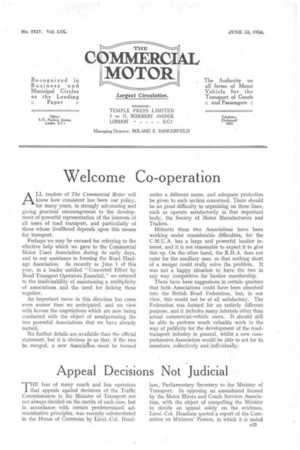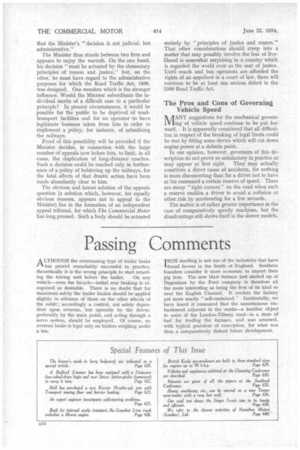Appeal Decisions Not Judicial
Page 29

Page 30

If you've noticed an error in this article please click here to report it so we can fix it.
THE fear of many coach and bus operators that appeals against decisions of the Traffic Commissioners to the Minister of Transport are not always decided on the merits of each case, but in accordance with certain predetermined administrative principles, was recently substantiated in the House of Commons by Lieut.-Col. Head lam, Parliamentary Secretary to the Ministry of Transport. In opposing an amendment framed by the Motor Hirers and Coach Services Association, with the object of compelling the Minister to decide an appeal solely on the evidence, Lieut.-Col. Headlam quoted a report of the Committee on Ministers' Powers, in which it is stated that the Minister's "decision is not judicial, but administrative."
The Minister thus stands between two fires and appears to enjoy the warmth. On the one hand, his decision " must be actuated by the elementary principles of reason and justice," but, on the other, he must have regard to the administrative purposes for which the Road Traffic Act, 1930, was designed. One wonders which is the stronger influence. Would the Minister subordinate the individual merits of a difficult case to a particular principle? In present circumstances, it would be possible for the public to be deprived of roadtransport facilities and for an operator to have legitimate business taken from him in order to implement a policy, for instance, of subsidizing the railways.
Proof of this possibility will be provided if the Minister decides, in connection with the large number of appeals now before him, to limit, in all cases, the 'duplication of long-distance coaches. Such a decision could be reached only in furtherance of a policy of bolstering up the railways, for the fatal effects of that drastic action have been made abundantly clear to him.
The obvious and fairest solution of the appeals question (a solution which, however, for equally obvious reasons, appears not to appeal to the Minister) lies in the formation of an independent appeal tribunal, for which The Commercial Motor has long pressed. Such a body should be actuated entirely by "principles of justice and reason." That other considerations should creep into a matter that may possibly involve the loss of livelihood is somewhat surprising in a country which is regarded the world over as the seat of justice. Until coach and bus operators are afforded the rights of an appellant in a court of law, there will continue to be at least one serious defect in the 1930 Road Traffic Act.
The Pros and Cons of Governing Vehicle Speed
MAANY suggestions for the mechanical governMing of vehicle speed continue to be put forward. It is apparently considered that all difficulties in respect of the breaking of legal limits could be met by fitting some device which will cut down engine power at a definite point.
In our opinion, however, governors of this description do not prove so satisfactory in practice as may appear at first sight. They may actually constitute a direct cause of accidents, for nothing is more disconcerting than for a driver not to have at his command a certain reserve of speed. There are many "tight corners" on the road when such a reserve enables a driver to avoid a collision or other risk by accelerating for a few seconds.; The matter is of rather greater importance in the case of comparatively speedy machines, but the disadvantage still shows itself in the slower models.




























































































